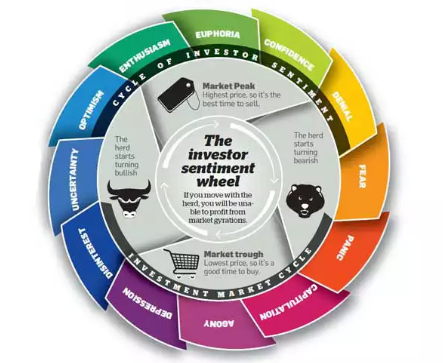First-Time Investors: 7 Steps To Getting Started
 Here’s a tip to help you become rich: you need to start investing in stocks to enhance your earnings and generate long-term wealth. The monthly salary from your job is essential, but how you invest that money is critical for achieving financial freedom.
Here’s a tip to help you become rich: you need to start investing in stocks to enhance your earnings and generate long-term wealth. The monthly salary from your job is essential, but how you invest that money is critical for achieving financial freedom.
You can only work while you are awake and in the office. However, if you have your money in the stock market, it can earn returns all day, every day. If you are a first-time investor, you need to follow these seven steps to ensure that you are doing it right.
Growing Money: Learn Before You Earn
Investing is a dynamic process which involves a lot of ups and downs. Many times, the dynamism of markets can frustrate a new investor. Understanding the markets and its history helps ensure that you know what you are getting into.
When it comes to investing, you’ll want to read up on as much as you can. There is a ton of financial information available in the form of books, newspapers, blogs, and so much more. My personal favourite is The Snowball, a book on the legendary Warren Buffet. Reading the Wall Street Journal is also a good start.
There also are online investment courses worth checking out. These courses help people with limited knowledge to start investing, which is valuable to first-time investors.
The Time is Now: The Earlier You Start, the Better
The early you start, the better. Albert Einstein once said, “Compounding is the eighth wonder of the world. He who understands it, earns it… he who doesn’t, pays it.” Let’s do the math.
For example, there are two friends, A and B. At the age of 30, A starts investing $1,000 every month for 10 years. B starts investing $2000 every month for five years at the age of 35. Both invest and achieve a measly 10 percent annual return. Now, considering that both invested the same principal ($120,000), you will be pleasantly surprised to see that A’s portfolio is worth $206k and B is worth $160k. A has an additional $46,000! Compounding helps in growing your wealth exponentially. Simply because WHEN you start saving outweighs HOW MUCH you save.
Risk vs. Reward
It would help if you were conservative during the initial phase of investing. It’s a pure gamble if done without knowledge, so you must have a conservative approach to get ahead.
Limit the use of leverage at the start. Dabbling in futures or trading stocks on margin is a sure fire way to lose capital for a new investor.
The investor should analyze his situation from a risk standpoint. The amount of risk you can bear is important to consider. If you are looking to buy a home for your family in the next one to two years, investing the deposit money in stock markets might not be a good idea.
Diversify Your Portfolio
“Money is like manure, you have to spread it around or it smells.”- J. Paul Jetty.
Same goes for investing; the first-time investor should look to invest anywhere between five and 10 stocks. Even if you had a “solid tip” or have done your research, investing in a single stock does not make sense. The risk is just too high. Diversification ensures that one wrong call does not wipe off your entire investing capital.
Analyze the Stock Before Buying
Investing in a business that you understand is the best way to start. For instance, if you are a doctor, you can start with investing in a pharma company or a health insurance company. It will be easy to understand the business model, check the company’s reputation and understand the story behind the numbers.
The ability to understand the financial numbers behind a stock price is essential for investing successfully. Financial ratios help you understand key financial and operational metrics. Some of the important ones are:

- Price to earnings ratio
- Price to book value ratio
- Price to sales ratio
- Debt to equity ratio
- Asset turnover ratio
*Comparison of P/E ratio of different stock to choose the best
You can click here to understand more on P/E ratios.
Manage Your Emotions
Even after holding a well-diversified and well-analyzed portfolio, the results might not be to your liking. Multiple factors drive the markets in the short term, and thus, an investor must have a good hold over his emotions.
It would be best if you got in the habit of investing regularly and with proper discipline. Patience is vital for investing in the stock markets. Never panic by only looking at theoretical results. Unless it’s the time to sell, nothing is permanent.
As Warren Buffet once said, “We don’t have to be smarter than the rest; we just have to be more disciplined than the rest.”
Costs Associated
Dealing independently or through wealth managers (brokers) make a huge difference. There are different kinds of broker services available, either online or offline, that charge a certain percentage as a commission, or a fixed fee for their services. These costs make a huge difference in the final returns. So you should compare the costs when dealing through a financial intermediary.
The Bottom Line
One must have good money management skills accompanied with patience and persistence. Being disciplined and investing regularly can help you generate gains in the long run.
It requires an eye to figure out the best stock to invest in. This is only possible if you have a regular habit of reading financial papers, books, magazines, and blogs. These provide you with an edge in investing.
If you have never invested before, the time is now. It’s never too early to start investing. Compounding has a significant effect on returns. The early you start the better.
Be cautious when investing. Don’t put your health or emergency funds in the stock market. Opportunity costs of investing must be evaluated and acted upon with due diligence.
Note: This article originally appeared at Modest Money. The author is Jeremy Biberdorf.
Category: Investing in Penny Stocks



